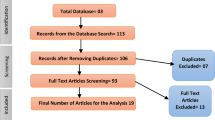Abstract
The current investigation evaluated psychological and personality profiles of applicants to the diaconate and priesthood for several Episcopal dioceses. Applicants included both genders and their ages ranged from 29 to 67 years. A psychological testing battery including the MMPI-2, 16PF, and MCMI-III was administered to 42 applicants between 2008 and 2009 who subsequently entered the diaconate or priestly formation program in the Episcopal Church. Results indicate that these applicants were generally well-adjusted. Findings also suggest some tendency for defensiveness, repression, naïveté, and a strong need for affection, as well as for being emotionally stable, intelligent, trusting, and open to change. Finally, results suggest elevations on histrionic, narcissistic, and compulsive measures.
Similar content being viewed by others
References
American Psychiatric Association. (2000). Diagnostic and statistical manual of mental disorders, fourth edition-text revision (DSM-IV-TR). Washington: American Psychiatric Association.
Beit-Hallahmi, B., & Argyle, M. (1997). The psychology of religious behaviour, beliefs, and experience. New York: Routledge.
Boyle, G. J., Matthews, G., & Saklofske, D. H. (2008). The SAGE handbook of personality theory and assessment, vol 2: personality measurement and testing. Thousand Oaks: Sage Publications.
Butcher, J. N., Dahlstrom, W. G., Graham, J. R., Tellegen, A., & Kraemmer, B. (1989). Minnesota Multiphasic Personality Inventory (MMPI-2): Manual for administration and scoring. Minneapolis: University of Minnesota Press.
Camara, W., Nathan, J., & Puente, A. (2000). Psychological test usage: implications in professional psychology. Professional Psychology: Research & Practice, 31, 141–154.
Cattell, R., Cattell, A., & Catell, H. (1993). Sixteen personality factors questionnaire (5th ed.). Chicaco: Institute for Personality and Ability Testing.
Church, E. (2009). Red book table of statistics. New York: Episcopal Church.
John Jay College of Criminal Justice (2004). The nature and scope of the problem of sexual abuse of minors by Catholic priests and deacons in the United States. NY: Author.
Millon, T., & Bloom, C. (2008). The millon inventories: a practitioner’s guide to personalized clinical assessment (2nd ed.). New York: Guilford Press.
Musson, D. J. (1998). The personality of male Anglican clergy in England: The 16PF. Personality and Individual Differences, 25, 689–698.
Musson, D. J. (2002). Personality of male Anglican clergy in England: revisited using the 16PF5. Mental Health, Religion, and Culture, 5, 195–206.
Plante, T. G. (Ed.) (2004). Sin against the innocents: sexual abuse by priests and the role of the catholic church. Westport, CT: Praeger/Greenwood.
Plante, T. G., & Lackey, K. (2007). Are successful applicants to the roman catholic deaconate psychologically healthy? Pastoral Psychology, 55, 789–785.
Plante, T. G., Aldridge, A., & Louie, C. (2005). Are successful applicants to the priesthood psychologically healthy? Pastoral Psychology, 54, 81–90.
Plante, T. (2007). Homosexual applicants to the priesthood: how many and are they psychologically healthy? Pastoral Psychology, 55, 495–498.
Strack, S., & Millon, T. (2007). Contributions to the dimensional assessment of personality disorders using Millon’s model and the Millon Clinical Multiaxial Inventory (MCMI-III). Journal of Personality Assessment, 89, 56–69.
Author information
Authors and Affiliations
Corresponding author
Rights and permissions
About this article
Cite this article
Plante, T.G., Apodaca, C. Episcopal Applicants to Ordained Ministry: Are They Psychological Healthy?. Pastoral Psychol 60, 279–289 (2011). https://doi.org/10.1007/s11089-010-0315-6
Published:
Issue Date:
DOI: https://doi.org/10.1007/s11089-010-0315-6




